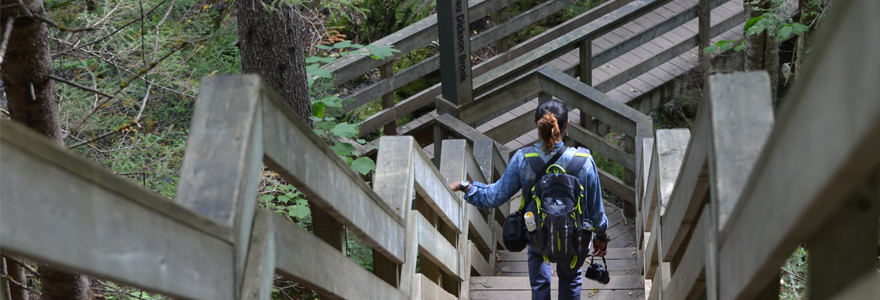News and Updates
Contact
Faculty of Social Science
Social Science Centre
Room 9438
Western University
T. 519-661-2053
F. 519-661-3868
E. social-science@uwo.ca
Using the digital to create a connection to the natural world
May 27, 2022
Aranya Iyer in Fundy National Park - submitted photo; story by Rob Rombouts
Aranya Iyer is the face of the Animalogic’s ‘World of Birds’ on YouTube, bringing interesting bird facts to people around the world. But her real passion is fostering a deep connection to nature, particularly for marginalized communities.
Iyer, a graduate student in Geography and Environment, uses satellite data to study how migratory birds navigate across featureless landscapes like deserts. Wanting to share her enthusiasm for these feathered creatures outside of research, she started an Instagram account which she used to share information and photos of birds, taken while out on hikes. She soon had an opportunity to join Animalogic as host of the World of Birds video series.
Through the YouTube channel, Iyer’s focus is on making information as accessible as possible, creating a virtual connection to nature. Iyer works with a group of talented writers, editors and producers to create high production value content for Animalogic. Each video highlights the natural history traits of birds from around the world like King vultures, Ground hornbills and even local birds like Peregrine falcons and Belted kingfishers.
“Visual media is very important. A lot of folks are visual learners and seeing something outside of your physical environment is magical,” said Iyer. “We may never interact with these birds in a physical sense, but if I can show you and forge a connection, it becomes an emotional connection of value.”
She also maintains other social channels, such as Instagram (@nerdmeetsbird), TikTok, and Twitter (@aranya6776), where she shifts the focus more onto conservation and accessibility and connection to nature.
Iyer has been thinking about the role of media in conservation, and feels that, while social media can help establish a network of individuals with similar interests, it is not a true substitute for action.
“Media is important to help people to recognize the diversity of birds and their fascinating life histories,” she said, “but how do we translate this knowledge and experience into policy and practice outside of media? When it comes to conservation, we need to get people to make changes. Media is an important tool. But it is just a tool; it likely won’t solve our stickiest problems.”
For Iyer, building strong, personal connections is important for conservation, and in her personal life.
“Possibly the biggest lesson I’ve learned is that regardless of the fun things that one gets to do when it comes to research and communication, the thing that matters is the actual physical people in your life, friendships, communities, relationships –as well as kinship to land, space, other living beings outside of humans. All of that matters a lot,” said Iyer.
Along with her roles with Animalogic, Iyer is part of a team of experts and graduate researchers organizing Field Research in Ecology and Evolution Diversified (FREED), a project to build interest and connection to nature and ecology for Indigenous, Black, and Racialized undergraduate students currently enrolled in the University of Toronto or Western University. The team is organizing a free, week-long field excursion to the Algonquin Wildlife Research Station (AWRS) in August 2022 for fifteen students. The excursion will consist of a series of workshops on a variety of field work and naturalist skills led predominantly by Indigenous, Black, and Racialized graduate students and experts.
Through her experience, Iyer said that she has learned that it is important to be true to yourself and your interest, whether in life, or in social media.
“Anytime I can come in and show up with a more unique distinct voice, the more rewarding it is, and the better the content does,” she said. “Choose something that feels like it’s going to be an extension of you, that way it is more likely to be sustainable and you are more likely to keep on doing it.”

